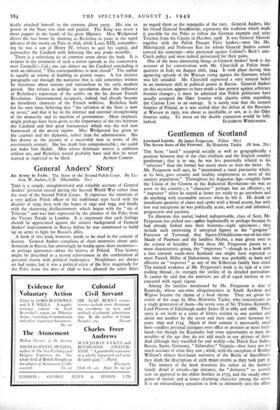General Anders' Story
An Army In Exile. The Story of the Second Polish Corps. By Lt.- Gen. W. Anders, C.B. (Macmillan. 2Is.)
THIS is a simple, straightforward and valuable account of General Anders' personal record during the Second World War rather than the story of the Second Polish Corps. It expresses the emotions of a very gallant Polish officer of the traditional type faced with the disaster of 1939, then with the hopes of 1941 and 1944, and finally with the shattering disillusionment which began with the " sin of Teheran" and was later expressed by the absence of the Poles from the Victory Parade in London. It is important that such feelings should be appreciated against the sinister background of General Anders' imprisonment in Russia before he was summoned to build up an army to fight for Russia's allies. A book of this kind, however, needs to be read in the context of history. General Anders complains of short memories about anti- Semitism in Russia, but unwittingly he trades upon short memories— or perhaps ignorance—about the history of Poland. That history might be described as a record achievement in the combination of personal charm with political bankruptcy. Neighbours arc always on bad terms, but it was a political error of the first magnitude for the bon, the days of 1848 to have allowed the other Slays to regard them as the renegades of the race* General Anders, like his friend General SosnItowski, represents the tradition which made it possible for the Poles to follow the German example and seize Tcschcn from the Czechs in October, 1938. It was General Sikorski together with the Polish Peasant Party leaders—men like Mr. Mikolajczyk and Professor Kot for whom General Anders cannot conceal his contempt—who protested against Colonel's Beck's anti- Czech policy and were indeed persecuted for their pains.
One of the most interesting things in General Anders' book is the account of his conversation with Mr. Churchill at Polish head- quarters in Italy on August 26th, 1944. It took place during that agonising episode of the Warsaw rising against the Germans which was left unaided. Mr. Churchill expressed a very natural belief in an imminent shift in political power in Russia. General Anders on this occasion appears to have made a fine protest against arbitrary frontier changes ; it must be admitted that Polish politicians have usually accepted the Oder frontier with alacrity while regarding the Curzon Line as an outrage. It is surely true that the eastern frontier of Poland, as it was settled after the defeat of the Russians at Warsaw in 192o, was about as justifiable, or not, as is the Oder frontier today. To insist on the double expgnsion would be folly


































 Previous page
Previous page